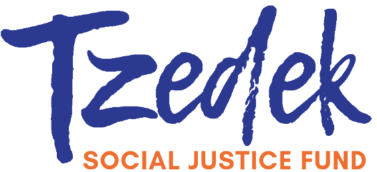Available in Español

Lindsay sitting still and going inward
By Lindsay Majer
I imagine our pause for the cause has looked like an eleven-month vacation. We did not welcome a new cohort of Fellows. We haven’t hosted lunch and learns or community forums. We haven’t produced widgets. Though our grantmaking has continued and we recently announced several pilot programs, some of you may have wondered what we’ve been up to.
I can attest that we’ve been hard at work. We have been looking inward naming our privilege, looking power in the face, unlearning internalized beliefs, and resisting practices entrenched in white supremacy with patience, compassion and care for each other. It’s ongoing work that requires emotional labor and continual reflection. Here, I share with you part of my processing:
Going Inward
When we are in constant motion reacting to the immediate needs in front of us, it’s difficult to identify the systems and structures in place that perpetuate oppression. This pause has made us sloooow down and sit still in who we are, where we come from, what we value, and what we believe to be true.
I hold a lot of privilege and power as a straight, cisgender, abled, 38 year-old, formally-educated white female. White culture reinforces the idea that people who look like me have the answers, but the truth is, I don’t know what I haven’t experienced. And I have a responsibility to listen and learn from others’ experiences, hold space without being in the center of it, and amplify the voices of those whom society places in the margins.
Similarly, as AMKRF goes inward, we are identifying the power we hold as a funder. We are learning how the systems of philanthropy are oppressive, conspire to keep the status quo, and maintain power over. These systems are inconsistent with our values. Informed by the community listening project and guided by our trusted advisors, this pause has allowed us to think creatively about how to do philanthropy differently.
Relationships Are It
Over the past few months, AMKRF staff have spent a lot of time sharing stories about the places we’ve lived, the people who shaped us, and the experiences that have influenced our perspective. Sharing these personal stories felt revealing and vulnerable at times, but hearing and sharing these perspectives connected us on a human level. Getting to know each other in this way brought a new level of respect and trust.
With that trust, we started to examine the culture of our organization. What power does each of us hold? How does this inform our decisions? How does white supremacy show up in our organization? Knowing where each of us was coming from was helpful when having difficult conversations and identifying tensions within our organizational culture. When tensions arise, and they do, we trust they come from a place of deep caring.
Bringing our whole self to work is liberating. Valuing each other as a whole person rather than the hat they wear when they show up is truly a radical act. Taking the time to listen and share builds trust – trust in the process, trust in each other, and trust in what you are working to create.
Culture Building
As we peeled back the layers of the AMKRF onion throughout our pause, dominant white culture continued to show up. We identified that our communication was overly nice and non-confrontational. We asked everyone for input, but never shared how feedback would influence the decision making process. Our unspoken norms were reactionary and urgent. Our grant applications assumed white leadership and asked a lot of unnecessary questions. Our organizational policies were either absent or unclear leading to confusion and inequalities. Our outlook was apologetic, guilt ridden, and seeped in white fragility. We showed up in community unaware of the power we hold as a funder.
I could go on about all the hard truths we identified and continue to identify about our organizational culture. Fortunately, being aware and naming them is the first step to transforming them. Eleven months ago, I didn’t have time to think about these things let alone possess the words to name them. With some guidance* and patience, by going inward, trusting in relationships, and building our organizational culture, we are creating systems more in line with our values. We hope the culture we create as individuals within our organization ripples outward into a more just world.
*Extraordinary guidance provided by Tamiko Ambrose Murray of Ambrose Consulting and Beth Trigg of Taproot Consulting. Learn more about their work with social justice organizations by reaching out to them at ambroseconsultingwnc@gmail.com and beth.trigg@gmail.com.

